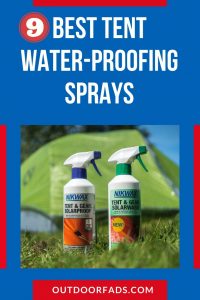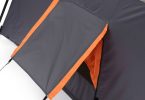We may receive commissions when you buy through the links on our site. Full Disclaimer.
If you or anyone you know has ever experienced the real-life horror of waking up in a tent to the dripping of rainwater soaking through your tent and onto your face, you will appreciate the need for tent waterproofing sprays.
The best tent waterproofing spray is usually liquids or solvents that contain fluoropolymers that prevent materials from being saturated in water. Tent waterproofing products are typically applied to the outer layers.
The spray then creates a coating that makes a seal around the sprayed material to prevent the absorption and eventual saturation of water.
Tent waterproofing sprays are essential to campers; the importance of checking tents for leaks before a camping trip cannot be over-emphasized. This is because, in cases of extreme weather, a leaking tent could result in the damage of personal items stored in the tent.
Although most tents are factory-made to be water-resistant, that attribute does not last forever, as exposure to elements may result in the weakening and subsequent eroding of the water-resistant coating.
It is up to you, then, as a tent owner, to take better care of your tent and maintain its water resistance so that you can enjoy your camping trip without any disturbance.
This article is going to cover some of the best tent waterproofing sprays that will help you efficiently and effectively care for your tent.
EDITOR’S BEST CHOICE
BEST DURABLE
BEST ON BUDGET
9 Best Tent Waterproofing Products
1. Kiwi Camp Dry Heavy Duty Water Repellent
Kiwi has been around forever. When it comes to making products for protecting and enhancing materials, Kiwi has got it down to par. Their ubiquitous shoe polish is proof of this.
The Kiwi Camp Dry Heavy Duty waterproofing spray is silicone-based, which makes it very suitable for nylon tents. The most exceptional selling point of this waterproofing spray is its cost-effectiveness. You can buy 2 or 4 bottles in a pack at a fraction of the original price.
It comes in 10.5oz aerosol cans that allow for an even and smooth application and has excellent coverage per can that is good for waterproofing a 7-man tent twice. Although it does not protect against UV, its water repellent layer is breathable and will not affect the fabric of your tent.
Specs
- Bottle: 10.5oz, 2 or 4 in a pack
- Surface: Nylon, leather, polyester, canvas
- Drying time: 24 to 48 hours
- Easy to apply
- Completely scent-free
- Works on natural and synthetic products
- Tents cannot be machine-washed.
- Not suitable for heavy use.
- May cause damage to lighter fabrics.
2. Star Brite Waterproofing Spray
Star Brite is most famous for manufacturing several classes of polishes, oils, brushes, and cleaners. With almost 50 years of experience in the industry, they hit the big thing on this one.
Their Star Brite spray is more than just a waterproofing spray. It is a stain repellent, a UV protector, and a waterproofing spray, all rolled together into one.
One of the most appealing features of this waterproofing spray is that it comes in two sizes, and you can purchase whichever one fits your need more.
It does require pumping for about ten or so times before it sprays. But it does not change the breathability of your tent fabric. It is reasonably priced and is even sure to repel bird droppings on behalf of your tent.
Specs
- Bottle: 128oz or 22oz
- Surface: Nylon, canvas, leather, and sunbrella fabrics
- Drying time: 6 hours
- Maintains color brightness
- Restores tent fabric vibrancy
- Offers protection from stains and mildew
- Ineffective against natural fabrics and polyesters.
3. Scotchgard Heavy Duty Water Shield
Scotchgard brought us scotch tape and quite possibly the most versatile waterproofing product ever made. Although the label says the spray is for patio and grilling, it is for much more than that.
From tent fabrics to furniture to outerwear and sports gear, Scotchgard waterproofing spray has proved to be the most efficient, and this makes it stand out among other waterproofing products.
Although it does not provide UV protection, you can rest assured that it will keep you dry for much longer and that neither fabric bleeding nor unwelcome odors will plague your tent.
Specs
- Bottle: 13oz
- Surface: Polyester, propylene, nylon, suede, leather, cotton, canvas, tarps.
- Drying time: 2 to 4 hours.
- Relatively cost-effective
- Dries really fast
- Longer-lasting
- Requires several layers of application for it to work.
- It has a small coverage area.
4. 303 Fabric Guard
303 products were originally designed with the sole intention of protecting aircraft. So you can be sure that a company that has spent years taking care of aircraft can take care of your camping tent.
The 303 Fabric guard is versatile and can be used for a variety of tents. One major plus of this tent waterproofing product is that it protects your tent from water as well as oil-based liquids.
Although it is a little pricey compared to other products, putting into consideration its incredible performance, it is worth every single penny.
Specs
- Bottle: 16oz and 32oz
- Surface: Canvas, sunbrella fabrics, suede
- Drying Time: 6 to 12 hours
- Completely odorless
- Has a special recommendation by Sunbrella
- Restores tent water resistance.
- If more than one layer of application is required, you have to wait at least 6 hours before reapplying.
5. Nikwax Tent Waterproofing Spray
Since 1977, Nikwax has aimed to be the trailblazer for maintenance and waterproofing products. They make some of the best cleaning supplies.
The Nikwax waterproof spray is no exception. It is a versatile spray that can be applied to several materials. It works to combine both waterproofing capabilities with protection from UV in a perfect blend. Also, it can be used on both wet and dry tents. This spray helps to clean your tent and keep the tent fabrics bonded together while maintaining the breathability of your tent.
The best thing about this waterproofing product is that it is water-based and contains neither VOCs nor PFCs. Its price is reasonable, and it is one of the commonest waterproofing sprays available, so it is easy to come by.
Specs
- Bottle: 16.9oz and 33.8 oz.
- Surface: Tents, marine fabrics
- Drying Time: 12 hours
- Biodegradable and environmentally friendly.
- It helps to retain elasticity, vibrancy, and waterproofing capabilities of tent fabrics.
- Not artificially scented.
- The spray is intended to work on synthetics, and may not work as well on natural fibers.
6. Atsko Silicone Water-Guard
Atsko claims to be able to provide waterproofing, cleaning, and personal care solutions, and they did more than deliver on this claim with the Atsko silicone water-guard.
The Atsko silicone water guard has a versatile application and stays on a variety of fabrics and surfaces. It does not affect the breathability or structural integrity of any material.
What makes the Atsko silicone water guard tick is the fact that one single coat is enough to keep your tent fully waterproofed.
Although it takes an excessive amount of time to cure, when it finally does, your tent is protected and safe.
Specs
- Bottle: 10.5oz.
- Surface: Tents, suede and sleeping bags.
- Drying Time: 12 hours to dry, 72 hours to cure
- Cost-effective.
- It is versatile in application.
- Restores the vibrancy, look, elasticity, and water repellency of your tent.
- It takes too long to dry and way too long to cure. Hence, it is not one of the instant tent waterproofing products.
7. Atsko Sno-Seal Water-Guard Extreme Repellent
This is yet another product from Atsko. Both products are closely related but differ in a few ways. The Sno-Seal takes waterproofing to a whole new level and is more reliable than the Atsko silicone water guard.
The one thing that the Atsko Sno-Seal has going for it is that you can apply it to materials other than your tent. It is designed to be flexible and multipurpose in use. It allows the breathability of tent fabrics while doing nothing to impair the design and fibers of the tent. Instead, it creates a slightly visible sheen that protects against mildew, mold, fungi, and algae.
Specs
- Bottle: 10.5oz.
- Surface: Tarps, tents, backpacks, boots, luggage, leather, fabric
- Drying Time: 1 to 2 hours
- Easy to apply
- It is odorless when dry and cured
- It also helps to protect your tent from UV radiation.
- You have to shake the aerosol can ever so often during application for it to work
8. Aqua Armor Fabric Waterproofing Spray
Aqua Armor waterproofing spray is the brainchild of Trek7, a California-based company that believes that fabric care products should be safe and effective.
Their waterproofing spray is water-based and contains no VOCs, PFCs, or other environmentally harmful products. It is formulated to work on gears, tents, and a host of different surfaces.
The best thing about the Aqua Armor fabric waterproofing spray for your tent is that it is resistant to both water-based and oil-based liquids.
Unlike other colorless sprays, this has a somewhat milky color and is best applied to the tent with a roller.
Although it will not protect your tent from fading or other UV-related problems, you can be safe in the knowledge that your tent is protected from spills and stains.
Specs
- Bottle: 32 oz.
- Surface: Leather, polyester, nylon, fabric
- Drying Time: 48 to 72 hours
- Entirely odorless
- Does not cause yellowing or staining
- Durable and long-lasting.
- Takes too long to dry and cure
9. Metaflux Universal Waterproofing Spray
The very last of the best tent waterproofing product we are reviewing is the Metaflux universal waterproofing spray.
This spray is water-based and helps protect your tent from water, grime, snow, dirt, grease, and even mud. It leaves no residue on the fabric of your tent and does not affect its structural integrity.
Specs
- Bottle: 13.5oz.
- Surface: Fabric, leather, tex materials
- Drying Time: 24 to 48 hours
- Has no residual odor
- Easy to apply
- Requires only a single layer of coating
- You may only use the spray for a few seconds.
- Can’t be used in direct sunshine
- May not be applied on hot surfaces.
Best Tent Waterproofing Spray – Buying Guide
There are so many different types of waterproofing sprays, each with its peculiarities and distinctive features. The sheer number of brands, features, and other things to consider before buying a tent waterproofing spray can be so overwhelming that you are at a loss as to which to purchase.
To make the decision-making process easier on you and the wellbeing of your tent, here are a few things for you to keep in mind:
Cost
A perfect tent waterproofing product should not be necessarily so expensive to tear a hole in your pocket. If you have a family-sized tent, one or two functional units should be enough to give your tent a proper coating. When the cost of the waterproofing product is nearing or eclipsing the value of the tent itself, please walk away — Fast.
Application and Safety
It is not nearly enough that the price of the spray is within reasonable limits; it should be relatively easy to apply. Proper application can mean the difference between effective waterproofing and shoddy waterproofing.
The majority of waterproofing sprays come in two forms: aerosol metal spray cans or hand spray bottles for direct use.
Aerosol Sprays
These are noted for their even dispersal on a surface. The mist from aerosol spray cans is excellent and consistent, making them easy to use and offering your tent better protection. As good as they are though, there are a few downsides to aerosol spray cans:
- They contain, in addition to the waterproofing solution, propellants that contribute to your carbon footprint are bad for your health and the environment.
- Yet another danger posed by aerosol cans is pressurization. A small puncture, corrosion, rise in temperature, or a faulty valve may lead to depressurization. In extreme cases, an aerosol spray-can may explode, causing burns and showering you with metal shrapnel.
- It is interesting to know that waterproofing sprays in aerosol cans can be a little more expensive than those in non-aerosol ones. This is because the propellant in aerosol cans contributes as much as 15% to the weight of the can. Factor in the manufacturing cost of the residual materials, and it becomes obvious why using aerosols incur a somewhat higher cost.
Hand Spray Bottles
They contain no additives or propellants, just your good old waterproofing spray. As such, there are no additional hazards related to them, save that of the components of the spray. They have small hand pumps and nozzles that help to direct the stream of spray. They are not quite as easy to use as aerosol cans, and they do not produce quite as perfect a result. But they have none of the attendant risks of using an aerosol can.
Chemical Composition
When it’s all said and done, waterproofing sprays are composed of chemical compounds. And even the best of them have strong enough chemicals that can cause minor skin irritations or more severe health challenges. Two chemicals to watch out for are:
- VOC: These are Volatile Organic Compounds, substances that become gas or vapor very easily. They are commonly applied in solvents and other industries. Breathing in VOCs can irritate the nose, eyes, and throat; it can result in breathing difficulties and long term damage to the central nervous system. Some VOCs have also been reported to cause cancer. When used outdoors, they contribute to the depletion of the ozone layer.
- PFCs are non-naturally occurring chemicals, all human-made. They are commonly used in waterproof membranes and DWR (durable water repellent) coatings. They also help to give fabrics stain and water-resistant properties. Research, however, has shown that continued exposure to these compounds can result in cancers of the kidney, lungs, liver, and pharynx, as well as cause leukemia. Pregnant women are strongly advised to steer clear of products containing VOCs, as it may result in a lot of developmental defects for the fetus.
The bottom line is, if a product contains either of the above chemical compounds, you might want to reconsider buying it. Maybe never.
Suitability for Tent Fabric
Even though waterproofing sprays are all chemicals, they do not all have the same composition, and so should be used on different materials and tent fabrics. To this end, you should know the coating material used in your tent. It is always printed on the label or on the tent itself. Generally, tent coatings are in three categories:
- Silicone Coating: This is usually applied to tents made from nylon. Silicone is water repellent and so quickly dries off after shaking off excess water. A silicone coating tent is more expensive and may cause greater condensation. By extension, sprays for silicone coatings may also be more expensive.
- Polyurethane Coating: is like an extra layer sticking to the surface of the fabric of your tent. It is less expensive, more affordable, is more breathable than silicone, and allows the application of tape on your tent fabric. Polyester tents often have a polyurethane coating.
- SIL/PU Coating: This is a hybrid of both silicone and polyurethane coating, with silicone on the outside and polyurethane on the inside.
The kind of coating that your tent has will determine what spray type you use. A spray for a silicone coating may not work as well as on a polyurethane coating. This, of course, does not mean it will not do any good. It just might have weaker waterproofing effects, or in some cases, may cause damage to the fabric of your tent.
UV Protection
Ultra Violet rays are electromagnetic radiation emitted by the sun. In humans, they can cause skin damage. Humans are, however, not the only creatures that feel the brunt of UV rays. Inanimate objects like your tent are also vulnerable to UV rays. Prolonged exposure to UV rays can cause the fabric of your tent to fade or even weaken the structural integrity of your tent. It is, therefore, better that you consider buying a spray that will afford your tent some measure of protection from UV rays.
FAQs – Best Tent Waterproofing Sprays
How often should I waterproof my tent?
Under normal circumstances, once every couple of years should be enough. Some people wait until the tent starts leaking before they waterproof. This is not a very good idea. It is better to prevent the leak than trying to fix it. The principle of prevention is better than cure works every time.
Should I seal inside or outside of the tent?
You can seal either inside or outside. And you can as well seal both inside and out, for an extra layer of protection, although most tent makers will tell you to seal on the inside.
How long does waterproofing last in a tent?
It lasts until it doesn’t. There is no hard and fast rule on how long waterproofing lasts. Generally, though, the waterproofing on a brand new tent should last for no shorter than a period of 6 months. After that, you may need to touch it up.
Can waterproofing spray damage my tent?
Yes, if you use the wrong spray.
From what distance should I apply the spray?
For safety reasons, from about 12 inches. The spray bottle should have more instructions for you to follow.
Does waterproof spray expire?
Like every other product, yes.
Applying A Waterproof Tent Spray
Using your tent waterproofing product depends on the form in which it comes. Sprays in aerosol cans should simply be sprayed all over the tent. While some sprays may need a paintbrush for application, some others may come in liquid form where you may need the help of a piece of cloth for application. However, the process is very nearly the same:
- Spread your tent out on a warm day when it is not raining
- Clean it with a damp cloth if dirty, then leave to dry.
- Put the tent in a shady place and apply the spray.
- Let the spray dry and cure before packing your tent indoors.
Note that direct sunlight is not very conducive to waterproofing sprays.
Seam Sealing Vs Waterproofing Spray
Seams are places where tent fabrics are stitched together. They are little holes that have threads running through them, and when not properly sealed, they allow water into your tent. A special tape or seam sealer can be applied to make the seams waterproof. A spray may not be enough to put a plug in the stitch holes. Waterproofing spray, on the other hand, applies to the fabric of your tent.
Tent Waterproofing Tips To Stay Dry
As much as possible, even when your tent floor is waterproof, always lay a tarp under your tent to protect the floor of your tent.
Do not keep your tent in direct sunlight; UV rays are detrimental to the fabric of your tent. Pitch your tent uphill, not downhill, where runoff water may pool together and soak your tent.
Finally, do not wait until you are out camping before waterproofing your tent. Waterproof your tent before your trip starts. If your tent does not have a rainfly, invest in one; or improvise with a tarp.
Also Read: Best Tent Waterproofing Methods
Final Notes
Your camping trip is only as enjoyable as the durability of your camping tent. With this article, you probably know by now what waterproofing spray will go best for your tent. So, do go out and get it. As we have said, don’t wait until the last possible moment before saving your tent. Maintenance is key to getting your money’s worth out of your tent, or you may just end up buying a tent every single time you’re going camping.





















